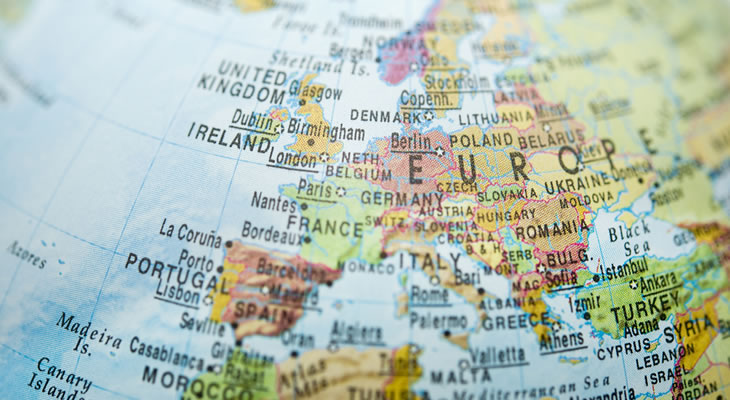Pound Sterling Euro (GBP/EUR) Exchange Rate Slides as France Enters ‘Period of Recovery’
UPDATE: The Pound Sterling Euro (GBP/EUR) exchange rate continued to fall by around -0.2% this afternoon. This left the pairing trading at around €1.1063.
The single currency made gains during today’s session as France’s PMI data buoyed the Euro.
Data revealed private sector activity returned to growth for the first time in four months in June’s flash data.
Both the country’s manufacturing and services sectors reported growth this month, and jumped to a four-month high.
Commenting on today’s data Eliot Kerr, Economist at IHS Markit said:
‘The latest PMI data suggests that France is finally entering a period of recovery as we move past the peak of the coronavirus crisis. The further loosening of restrictions has allowed some semblance of normality to resume, with many businesses and workers returning to work, particularly in the manufacturing sector.
‘Barring any large scale second outbreak, demand should also follow activity into expansion territory, as confidence continues to recover. Given ongoing cross-border restrictions in many countries around the world, this will most likely be driven by the domestic market in the short-run, with international demand taking a little longer to recover.’
Pound Sterling Euro (GBP/EUR) Exchange Rate Slides as German PMI Jumps to Four-Month High
The Pound Sterling Euro (GBP/EUR) exchange rate edged -0.2% lower this morning. This left the pairing trading at around €1.1061.
The single currency edged higher against the Pound this morning after German PMI data showed further signs of a turnaround in activity.
Germany’s flash headline PMI composite came in at the highest level in more than four months. The index rose from May’s 32.3 to 45.8 in June.
Today’s flash survey indicates the effects of easing lockdown restrictions and shows business confidence in the bloc’s largest economy has improved.
However, the data showed that due to coronavirus disruptions, and uncertainty which has dampened demand, the economy is set to face a slow recovery.
Commenting on this, IHS Markit’s Principle Economist, Phil Smith noted:
‘June’s flash survey shows the PMI rebounding further from April’s low point and moving to its highest since before the start of the coronavirus outbreak, amid increasing signs of life across the German economy.
‘However, while the loosening of lockdown restrictions has had a positive effect on some parts of the economy, the PMI’s latest reading is still within contraction territory, which shows this is likely to be a protracted recovery as coronavirus-related disruption and uncertainty continue to weigh on demand.
‘There was no separating manufacturing and services in terms of output trends in June, with both seemingly over the worst but far from firing on all cylinders. Firms are starting to feel a bit more bullish about the outlook, but even so there are concerns for the labour market, with the pace of factory job losses hardly letting off in June.’
Sterling (GBP) Slides despite PMI Rebounding From Earlier ‘Crippling Lows’
The Pound slipped today as the UK Prime Minister Boris Johnson is expected to announce further lockdown easing.
Markets anticipate the PM to announce that cinemas, galleries, and museums will be allowed to reopen on 4 July. Added to this, the 2m rule may be reduced to 1m which would further support the hospitality sector.
Meanwhile, PMI data this morning showed that the manufacturing sector led the turnaround momentum across the British economy this month.
Both the services PMI and manufacturing PMI jumped to a four-month high, with manufacturing edging back into growth territory. However, Sterling struggled to make gains as the service sector remained in contraction territory.
Manufacturing rose from May’s 40.7 to 50.1 in June’s flash estimate thanks to the easing of coronavirus lockdown restrictions.
Commenting on this morning’s data, Group Director at CIPS, Duncan Brock said:
‘At the end of the second quarter we saw some uplift in the UK private sector as lockdown eased, businesses started opening up and activity increased from the crippling lows of the last few months.
‘Though the index still remained below the no-change mark in June, its rise since May was a survey record, creating another signal that some bounceback has started to emerge following April’s historic lows. This is just a beginning however as business spending remains flat and supply chains stutter into action.
‘In general, this is good news for the UK economy, but in terms of any significant recovery, 2020 is likely to be a write-off. The following year may see some more stability and real growth as the pandemic’s effects continue to ripple through the remainder of 2020.’
Pound Euro Outlook: Will the PM Ease Lockdown Restrictions Further?
Meanwhile, the Pound (GBP) could edge higher later today against the Euro (EUR) following the Prime Minister’s announcement.
If Boris Johnson announces further easing of lockdown restrictions it will buoy Sterling sentiment.
Looking ahead to Wednesday, the Euro could claw back some losses against the Pound (GBP) following the release of German Ifo data.
The single currency could edge higher if tomorrow’s Ifo Business Climate reveals sentiment has improved more than expected. This would leave the Pound Euro (GBP/EUR) exchange rate flat if Johnson’s comments continued to support Sterling.


Comments are closed.